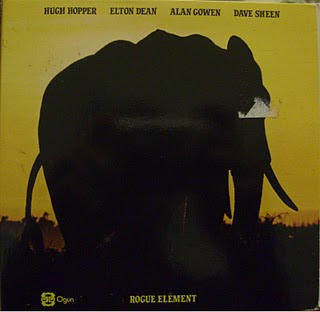:::Noisette:::
Posted: Monday, 30 April 2012 by jazzlover in Etykiety: Elton Dean, Hugh Hopper, Lyn Dobson, Mike Ratledge, Robert Wyatt, Soft Machine
3
This great Cuneiform album might just be the only recorded trace of SM ever being a quintet, down from a septet (as Nick Evans and Mark Charig both ex-Tippet boys had departed) before reducing to the quartet that will record the Third album (although Dobson will play a bit on it). These tapes are taken from a Jan 04, 1970 concert at Croydon just before one of their numerous tour de France and as opposed to a lot of live albums the quality of these recordings is excellent, probably thanks to Cuneiform even if they admit a bit of doodling about. Dobson still manages to make an impact on the others and is responsible for a scat/flute duo during Backwards. The repertoire they were playing by that time is lot closer to Third than the previous two albums of which only Hibou and We Did It Again are left (and greatly modified) as Wyatt was rather silent with the microphones. Even Moon In June bears no vocals, and the band was in top-notch form for a splendid night of semi improvised high-energy jazz-rock. This is maybe THE live album every SM fans was waiting for.
:::Review by Sean Trane:::
Soft Machine - Noisette (1970)
1. Eamonn Andrews (12:15)
2. Mousetrap (5:24)
3. Noisette (0:37)
4. Backwards (4:48)
5. Mousetrap(reprise) (0:26)
6. Hibou, Anemone And Bear (8:50)
7. Moon In June (6:55)
8. 12/8 Theme (11:25)
9. Esther's Nose Job (14:30)
10. We Did It Again (7:15)
Credits
- Elton Dean / alto sax , saxello
- Lyn Dobson / soprano sax, flute, vocals
- Hugh Hopper / bass
- Mike Ratledge / electric piano, organ
- Robert Wyatt / drums, vocals
Soft Machine - Noisette (1970)
1. Eamonn Andrews (12:15)
2. Mousetrap (5:24)
3. Noisette (0:37)
4. Backwards (4:48)
5. Mousetrap(reprise) (0:26)
6. Hibou, Anemone And Bear (8:50)
7. Moon In June (6:55)
8. 12/8 Theme (11:25)
9. Esther's Nose Job (14:30)
10. We Did It Again (7:15)
Credits
- Elton Dean / alto sax , saxello
- Lyn Dobson / soprano sax, flute, vocals
- Hugh Hopper / bass
- Mike Ratledge / electric piano, organ
- Robert Wyatt / drums, vocals
























